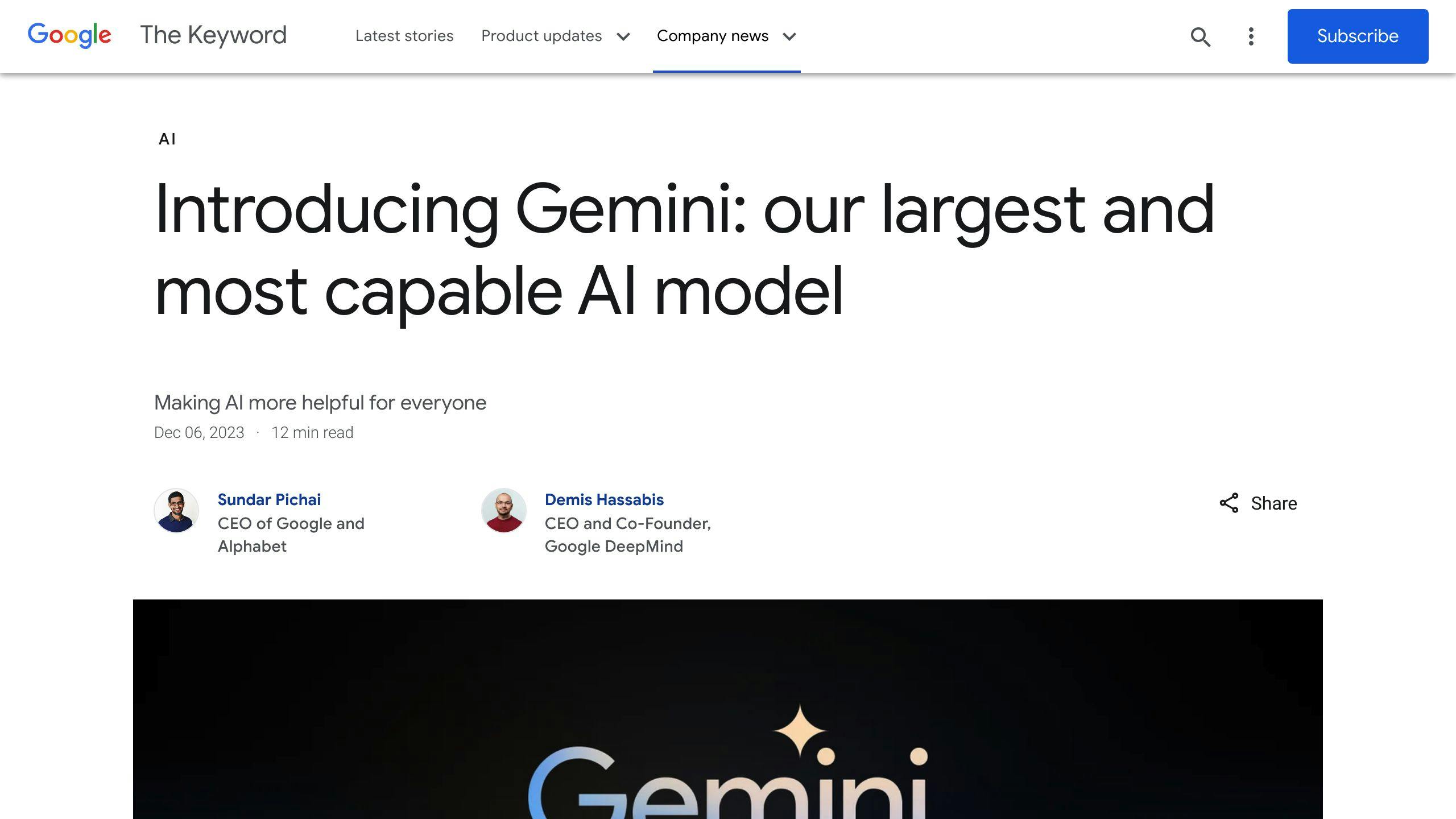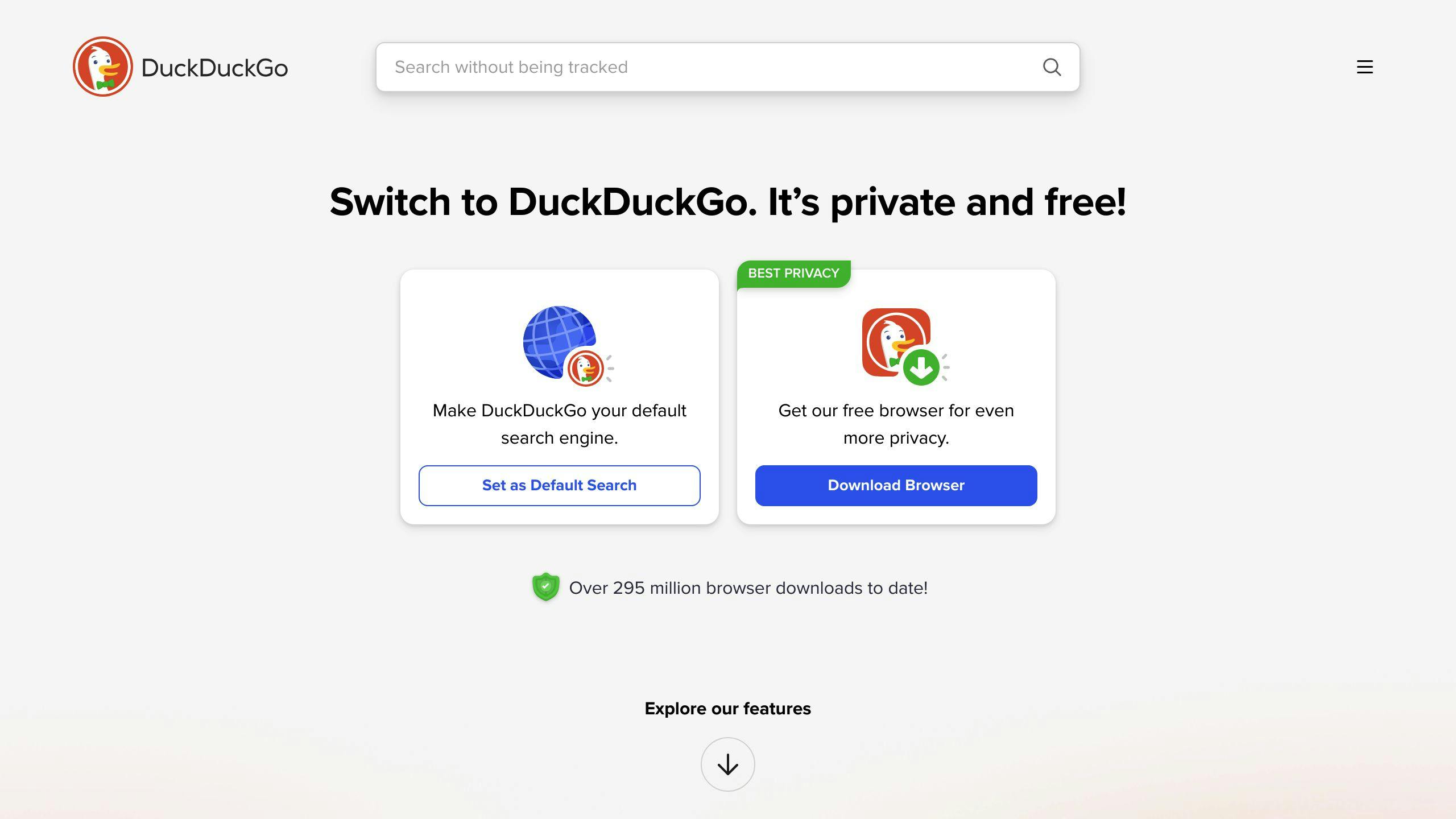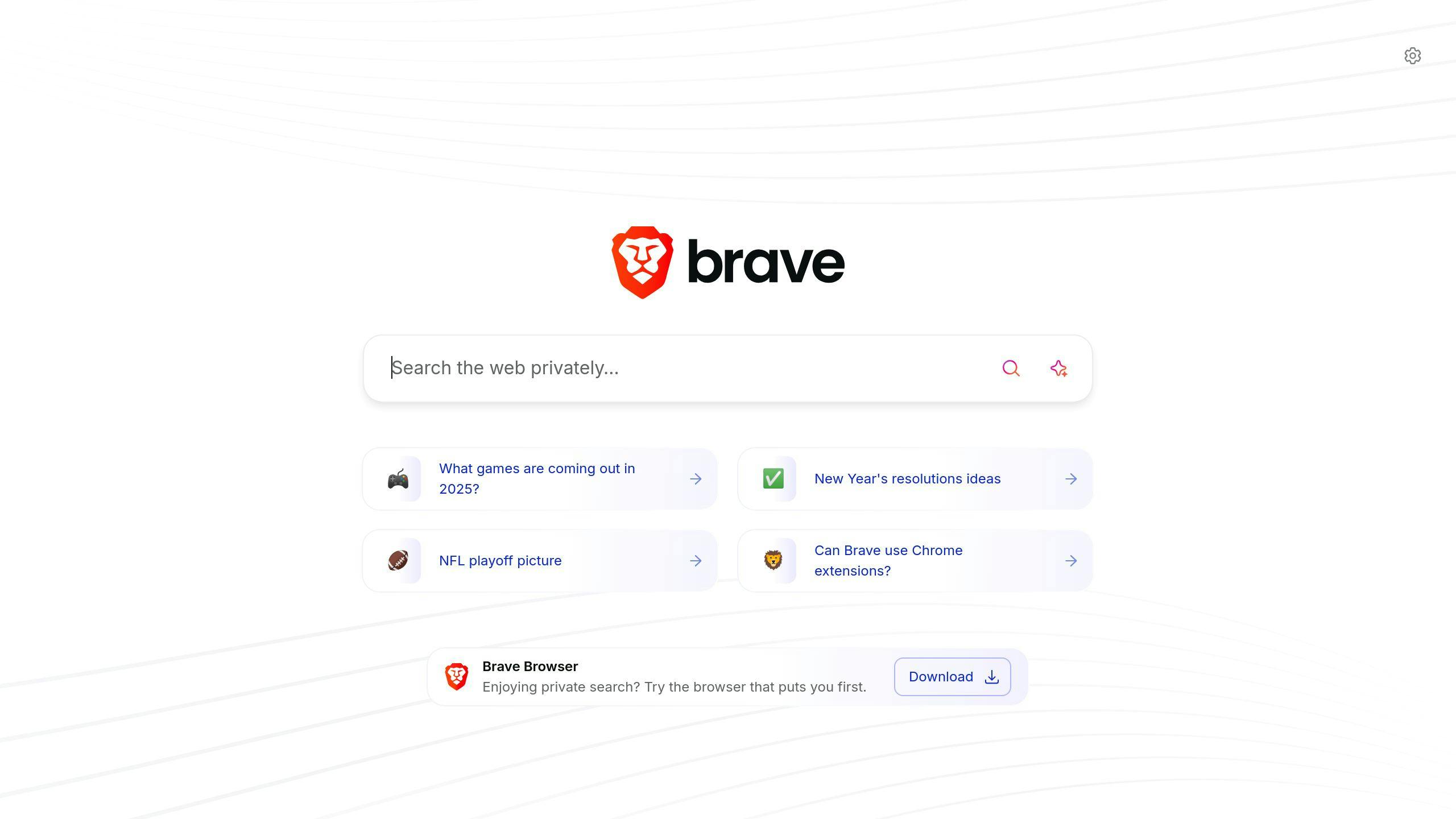Google dominates search engines in 2025 with a 92% market share, driven by advanced AI tools like Gemini and Project Mariner. Bing is growing with a 36% faster query speed and Microsoft 365 integration, appealing to professionals. Privacy-focused platforms like DuckDuckGo and Brave, along with regional leader Yandex, offer niche alternatives to users.
Key Highlights:
- Google: AI-powered tools for multimedia and local SEO; 92% market share.
- Bing: GPT-4 integration and professional focus; 6.11% US market share.
- DuckDuckGo: Privacy-first with 100M daily searches.
- Yandex: 60% market share in Russia, strong in local services.
- Brave Search: Independent index and crypto rewards; 20M active users.
Quick Comparison:
| Platform | Focus Area | Key Features | Market Share |
|---|---|---|---|
| Consumer AI | Gemini, Maps integration, multimedia | 92% (Global) | |
| Bing | Professional Users | Microsoft 365, GPT-4 | 6.11% (US) |
| DuckDuckGo | Privacy | Anonymous search | 100M daily searches |
| Yandex | Regional (Russia) | Local services, language support | 60% (Russia) |
| Brave | Privacy, Rewards | Independent index, crypto rewards | 20M active users |
AI is reshaping search strategies. Businesses must tailor content for AI-driven tools, focus on platform-specific features, and optimize for diverse user needs across these search engines.
Top 10 Best Search Engines
1. Google
Google remains the leader in the search engine world in 2025, holding a 92% market share [5]. Its dominance is fueled by cutting-edge AI developments that continue to reshape the industry.
One standout example is Project Mariner, a Chrome AI extension that integrates third-party data from platforms like TripAdvisor directly into Google Maps [1]. This practical use of AI highlights Google’s ability to innovate and improve user experiences.
| Feature Category | Google’s Capabilities |
|---|---|
| AI-powered algorithms and tools | Gemini, Project Mariner, Project Astra |
| Specialized Services | Google Shopping, Flights, Books, Maps integration |
Gemini: A Game-Changer for Search

Gemini is designed to handle complex queries with advanced AI, significantly improving search accuracy. It’s particularly helpful for businesses focused on local SEO and e-commerce, as well as for content creators working with multimedia. The tool now supports both text-based and visual searches, offering a more versatile experience.
Google’s strength lies in its ability to deliver precise results in multiple formats:
- Image and Video Results: AI-enhanced recognition elevates visual search.
- News Integration: Real-time updates appear seamlessly in search results.
- Local Business Features: Tools like Google Maps boost visibility for local businesses.
Adapting SEO for Google’s AI Era
For businesses, this AI-driven evolution means rethinking SEO strategies. Content must now cater to AI tools that combine text, images, and multimedia while fitting seamlessly into Google’s ecosystem [4]. This includes optimizing for platforms like Google Shopping and Maps to stay competitive.
While Google appeals to a broad audience, competitors like Bing are carving out niches, focusing on users with higher disposable incomes [2]. This creates a diverse search engine landscape, with each platform catering to different user groups in 2025.
2. Bing
By 2025, Bing has cemented its position as a key player in the search engine market, holding a 6.11% market share in the US [5]. This growth highlights how advancements in AI are reshaping competition and redefining what users expect from search engines.
AI-Powered Search Evolution
Bing has taken a hybrid approach, blending large and small language models to achieve a 36% boost in query processing speed. This improvement has made searches faster and more accurate, especially for complex queries [6].
| Feature | Impact on Performance |
|---|---|
| Query Processing | 36% faster response time |
| Deep Search | Better relevance in results |
| GPT-4 Integration | Handles complex queries more effectively |
| Microsoft 365 Integration | Streamlined workflows for business users |
Target Audience and Market Focus
Bing primarily caters to professionals and Microsoft users, making it a natural fit for businesses focused on enterprise solutions, premium products, and B2B services [2]. Its integration with Microsoft 365 enhances its appeal, offering tools that align with professional workflows.
Strategies for Businesses
To make the most of Bing’s AI-driven capabilities, businesses can:
- Craft clear, concise content optimized for Bing’s AI models [6].
- Tap into Microsoft 365 integration to boost visibility [2].
- Create structured, AI-friendly content designed for voice and conversational queries [2].
While Bing continues to strengthen its position with professionals, new search engines are entering the scene, bringing fresh features that add even more variety to the search engine landscape.
sbb-itb-39a0ef1
3. Emerging Search Engines
As Bing expands its reach among professional users, other search engines are carving out distinct spaces by emphasizing privacy and catering to specific regional audiences.
DuckDuckGo: Prioritizing Privacy

DuckDuckGo stands out for its focus on user privacy, handling over 100 million searches daily [4]. By combining its own index with anonymous data from other engines, it delivers results while ensuring user anonymity.
Yandex: A Regional Giant
Yandex leads the Eastern European market, holding a 60% market share in Russia [5]. Known for its expertise in facial recognition, local services, and support for Slavic languages, it remains a dominant force in the region.
Brave Search: Independent and Privacy-Focused

Brave Search combines privacy with cutting-edge features. With 20 million monthly active users, its AI-powered Summarizer delivers direct answers without compromising user anonymity [4].
Some standout features include:
- An independent index that avoids bias, verified against Google for accuracy [4]
- A rewards system offering cryptocurrency to engaged users
Tailored Optimization Approaches
Each platform calls for a unique strategy to maximize visibility:
- DuckDuckGo: Focus on high-quality, keyword-rich content.
- Yandex: Prioritize localized content and optimization in native languages.
- Brave Search: Ensure content is transparent and adheres to privacy standards.
These search engines are reshaping the landscape, giving businesses new opportunities to reach niche audiences.
Advantages and Disadvantages
The search engine landscape in 2025 offers a mix of strengths and challenges across platforms, helping businesses decide how to shape their digital strategies effectively.
Google’s Strengths and Challenges
Google commands an incredible 91% of global traffic, thanks to its advanced algorithms and tools like Shopping and Maps. However, its extensive tracking practices continue to spark privacy concerns [6] [4].
Bing’s Progress
Bing has embraced AI, using tools like LLMs and SLMs to speed up queries by 36% [6]. Its integration with Microsoft products is a major draw for professionals. Still, its limited 6.11% market share in the US makes it harder to reach a broader audience [5] [6].
Niche Platforms and Their Focus
Emerging platforms cater to specific needs: DuckDuckGo and Brave focus on privacy, while Yandex leads in Eastern Europe with features like advanced facial recognition [4].
Here’s a quick comparison to help businesses evaluate their options:
| Feature | Bing | Emerging Platforms | |
|---|---|---|---|
| AI Integration | Advanced consumer AI | ChatGPT integration | Tailored AI for niche needs |
| Core Features | Full search ecosystem | Microsoft 365 integration | Privacy-first (DuckDuckGo, Brave), Regional focus (Yandex) |
| Business Impact | Essential for broad visibility | Strong in professional sectors | Ideal for niche audiences and specific regions |
AI-powered search is reshaping how businesses approach SEO. Google leans on consumer-focused AI, while Bing enhances conversational search through ChatGPT integration [1] [6].
These contrasts underline the varied opportunities for businesses, offering pathways to tailor their digital marketing strategies effectively.
Conclusion
By 2025, the search engine landscape is shaped by AI and specialized features that heavily influence market dynamics. Google continues to dominate with over 92% market share, driven by its AI advancements that deliver highly accurate search results.
Bing is gaining traction, especially among professional users. Features like GPT-4 and LLM-SLM integration have boosted query speeds by 36% [6], underlining the importance of platform-specific optimization strategies.
| Platform | Focus Area | Optimization Approach |
|---|---|---|
| Consumer AI | AI-focused multimedia and content tools | |
| Bing | Professional Users | Integration with Microsoft tools, ChatGPT-optimized content |
| Emerging Players | Niche Markets | Regional content, privacy-focused messaging |
These strategies reflect the growing role of AI in search engine functionality, making it critical for businesses to align their SEO efforts with Google’s consumer-focused AI and Bing’s professional tools [1][3]. Using platform-specific analytics will also help track and enhance performance.
Platforms like Yandex and Brave present opportunities in niche markets, emphasizing regional content and privacy [4]. By tailoring strategies to each platform’s strengths, businesses can effectively navigate this evolving search ecosystem and maximize their reach.
FAQs
How do AI advancements in search engines compare to Google’s capabilities?
Google continues to lead the search engine market, but competitors like Bing and Brave are making waves with their AI integrations. Bing’s use of GPT-4 and its connection to the Microsoft ecosystem offer businesses tools for better content discovery and tailored search options [2]. Meanwhile, Brave stands out with its privacy-focused AI and independent indexing, appealing to those who prioritize security [4].
These developments highlight the growing variety in search engine features, with each platform catering to specific user needs. Whether it’s privacy, enterprise tools, or specialized searches, these alternatives are carving out their own space in the market.
What is Google’s market share in 2024?
As of 2024, Google holds more than 90% of the market share, largely due to its advanced AI and machine learning technologies [4]. This dominance is fueled by its ability to integrate user-friendly features and deliver highly effective search solutions [1].
However, the competitive landscape is shifting. Emerging players and new AI-driven tools are gradually influencing market dynamics [6]. While Google remains the leader, the rise of these innovations suggests potential changes in the years ahead.